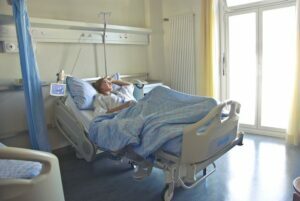Drug & Alcohol Rehab in Maidstone
Quick Links for help with addiction in Maidstone
- Why should I enter a drug and alcohol rehab in Maidstone?
- Inpatient vs Outpatient Treatment at a drug and alcohol rehab in Maidstone
- Organising an intervention in Maidstone
- How many days should I stay at a drug and alcohol rehab in Maidstone?
The United Kingdom has been struggling with the effects of drug and alcohol addiction for years.
With an increase in homelessness, the number of syringes being found in public, and greater amounts of alcohol and drug-related hospital admissions, the effects of drug and alcohol addiction are visible on the streets of the UK.
In 2020/2021, police in England and Wales recorded over 210,000 drug offences, which is almost 20% higher than the previous year. [1]
Drug-related deaths have increased by 72% from 2011 to 2020 in the UK. The case is similar in Maidstone, where the community is not exempt from the effects of drug and alcohol addiction.
Kent.gov.uk also estimated that addiction costs society over £15,400,000,000 annually.
The NHS is burdened with costs of as much as £448,000,000 annually, and NHS Kent is burdened with costs of over £71,200,000 annually due to drug and alcohol addiction. This equates to almost £60 per person in the county.
Aside from costs of public services due to addiction, it is estimated that almost 10,000 children are deemed ’at risk’ in the county of Kent, including Maidstone. [2]
Additionally, dual diagnoses, that is, people that suffer from addiction and another condition simultaneously, are more prevalent in Kent than in other areas of the UK.
The South East of England has the highest number of drug seizures in England. Around 25% of deaths in the region are alcohol-related, and NICE estimated that over 260,000 people in Kent were consuming alcohol at a high-risk level. [3]
A ‘high-risk level’ is considered to be a level where consumers will experience physical damage due to alcohol.
However, there are statistics which can provide some optimism. Of patients that seek the support of a drug and alcohol rehab in Maidstone or the surrounding area in Kent, 93% of patients left treatment successfully without representing.
Only 7% of patients re-presented within six months after having left treatment at their drug and alcohol rehab in Maidstone.
Below, we provide some statistics about alcohol and drug use in Maidstone:
| Drug and Alcohol Statistics in Maidstone | Data | ||
| Hospital admission rate for alcohol-specific conditions in Maidstone 2016/17 – 18/19 |
|
||
| Hospital admission rate for alcohol-specific conditions in England 2016/17 – 18/19 | 31.6 | ||
|
599.9 | ||
| Hospital admission rate for alcohol-related conditions in England 2018/19 |
|
Please call our 24-Hour Helpline: 0800 326 5559
OK Rehab can help you with referrals, advice, and information in Maidstone
OK Rehab is an expert referral service for addiction recovery. Our purpose is to get people who are in addiction into an appropriate rehab centre so that they can break the cycle of addiction and begin treatment as soon as possible.
Treatment may include residential rehab, outpatient treatment (via private counselling) and home detoxification.
No matter where your treatment takes place, we ensure withdrawal symptoms are fully treated. These treatments are suitable for alcohol addiction and drug addiction.
We also answer questions and provide guidance every step of the way, from the first phone call you make to providing an aftercare service for the 12 months after you leave rehab (when a residential programme is completed).
We have extensive knowledge of the countless treatment programmes, including private rehab facilities around the UK, so wherever you are, you can get the highest quality of treatment at a facility near you.
To get started, please call us on 0800 326 5559, and we can begin your telephone assessment with one of our trained staff.
During this conversation, we will ask you a number of questions about how addiction has affected your life in order to get a better idea of who you are as a person.
Once we have this information, we are able to make a decision on which inpatient rehab would be right for you.
From there, we can provide exact information on how much your treatment will cost, how long you will need to be there, and any other considerations around your stay at rehab.
For example, we can provide advice on arranging care for your children or other dependents, getting your finances in order, etc.
When you are ready, we can get you into rehab quickly in Maidstone, where you can begin treatment. Treatment typically begins with medical detox.
Please call our 24-Hour Helpline: 0800 326 5559
What is addiction?
Contrary to misconceptions which perpetuate the stigmas, addiction is officially recognised as a brain disease of chronic relapsing. It is important to recognise the severity of addiction which is driven by physiological changes, in order to help combat it.
When suffering from an addiction, a subject’s ‘reward pathways’ or ‘mesolimbic pathways’ in the brain are altered. They are altered in a way which makes them more dependent on particular substances.
When they consume their addictive substance, whether it’s alcohol or a drug, the neurotransmitter dopamine is released into the brain to provide relief and euphoria.
However, should a patient abstain from this addictive substance, they will begin to experience discomfort and sometimes severe withdrawal symptoms.
This means that they feel compelled to consume more of this addictive substance in order to unburden themselves from discomfort and in order to function.
At this point, the subject is suffering from substance use disorder (sud). The dangers lie in the cycle in which the subject finds him or herself.
As they consume more of the substance, their tolerance will increase, as will the severity of their withdrawal symptoms. They will continually increase their consumption levels until they can abstain or are seriously harmed.
The brain disease model of addiction is an evidence-based and progressive way to view addiction. This helps break down the stigmatisation of addiction and to educate others that it is, in fact, a disease rather than a lifestyle choice. [4]
Please call our 24-Hour Helpline: 0800 326 5559
What are some symptoms of addiction?

Symptoms of addiction manifest themselves in many different ways. Different substances will present different symptoms, and they can vary according to their severity, their form, and whether it is physical or psychological.
Physical symptoms may be caused and exacerbated by substances such as alcohol or heroin.
These symptoms can range from things such as nausea, fatigue, trembling, headaches, muscle aches, and even seizures. If left untreated, physical symptoms of addiction can be fatal.
Psychological symptoms caused by products such as cocaine or cannabis include but aren’t limited to anxiety, depression, insomnia, erratic behaviour, and more.
While they can be psychologically debilitating, they aren’t as dangerous as physical symptoms.
Please call our 24-Hour Helpline: 0800 326 5559
Am I addicted?

It can be difficult for someone to determine whether or not they are addicted.
Some people may dismiss their symptoms as something other than a product of addiction, whereas others may over exaggerate common symptoms and presume that they are suffering from a drug or alcohol addiction.
While it is imperative that subjects seek a diagnosis from a professional counsellor in Maidstone, there are other more convenient ways to gain insight into the severity of their substance use disorder.
Please call our 24-Hour Helpline: 0800 326 5559
The CAGE Questionnaire

Subjects can utilise the CAGE Questionnaire to assess whether or not they are fighting an alcohol addiction. This is a swift and accessible tool to help subjects determine whether or not they need to enter a drug and alcohol rehab in Maidstone.
The CAGE Questionnaire is a validated method and is often utilised by clinicians to help understand the severity of someone’s substance use disorder. The CAGE Questionnaire consists of four questions, which are;
- Have you ever felt that you should CUT down on your drinking?
- Have you ever become ANNOYED at criticisms about your drinking?
- Have you ever felt GUILTY about your drinking?
- Have you ever had a morning EYE OPENER to get rid of a hangover?
If subjects answer ‘yes’ to two questions, then it would imply that they are suffering from a substance use disorder.
Should subjects answer ‘yes’ to the questions concerning the ‘EYE OPENER’, then it would also indicate that they are suffering from a substance use disorder.
Please call our 24-Hour Helpline: 0800 326 5559
The AUDIT Screening Test

Another useful screening method for those thinking that they could potentially be battling alcoholism is the AUDIT or Alcohol Use Disorder Identification Test. [5]
Similar to the CAGE Questionnaire, AUDIT requires the subjects to answer a set of questions with complete sincerity.
There are ten questions which are concerned with the consumption and consequences of drinking alcohol. The subjects will then receive a score which will share more details on their addiction severity.
Subjects who receive a score of eight or higher are likely to be suffering from a moderate form of alcohol abuse.
Subjects who receive scores of 13 or higher are likely to be suffering from severe alcohol abuse and should seek the support of a drug and alcohol rehab in Maidstone.
Please call our 24-Hour Helpline: 0800 326 5559
The DSM-5 Screening Method

For subjects wondering whether they are suffering from an addiction other than alcohol, they can utilise the Diagnostics and Statistical Manual of Mental Disorders (DSM-5). This is an effective screening method which is often used by clinicians. [6]
The DSM-5 associates four kinds of symptoms associated with addiction. These are impaired control, physical dependence, risky use, and social problems.
If subjects find that they are suffering from two-or-three symptoms, it implies that they are suffering from a moderate form of addiction. Subjects suffering from four might be suffering from a severe form of addiction.
Please call our 24-Hour Helpline: 0800 326 5559
Why should I enter a drug and alcohol rehab in Maidstone?
If subjects enter a drug and alcohol rehab in Maidstone, they will undergo treatment in the most optimal environment.
Addiction recovery cannot be achieved independently, and at a drug and alcohol rehab in Maidstone, patients will receive the utmost support at a medically supported rehab facility occupied by medical professionals.
Those who try to recover independently are not only likely to fail but feel discouraged by the notion of attempting to abstain again. Because of this, it is important to fully commit to recovering with as much support as possible.
Please call our 24-Hour Helpline: 0800 326 5559
What if I suffer from more conditions?

It is often the case that patients that enter a drug and alcohol rehab in Maidstone or elsewhere need additional treatment for another condition, whether mental or physical.
According to the Adult Substance Misuse Treatment Statistics 2019-2020 report, 59% of patients entering addiction treatment needed additional mental health treatment.[7]
Mental health issues can make subjects more susceptible to falling into a drug or alcohol addiction. On the other hand, addiction can lead to or exacerbate mental health issues. There is a strong correlation between addiction and mental health issues.
Because of this, it is imperative that subjects in Maidstone seek support before their addiction leads to any other mental health issues.
Subjects should disclose any additional mental or physical treatments they require before they enter a drug and alcohol rehab in Maidstone.
During the admission process, a preadmission or health assessment will be conducted, and subjects can express any personal requirements they desire.
Then, a dual diagnosis will be made, and a consultant psychiatrist will develop a personalised recovery programme which treats both their addiction and any other conditions that they have.
Often, patients suffering from addiction also suffer from anxiety, depression, bipolar disorder, and other conditions.
Please call our 24-Hour Helpline: 0800 326 5559
Is recovery via a drug and alcohol rehab in Maidstone accessible through the NHS?

The NHS also provides drug and alcohol addiction recovery programmes in Maidstone for those who need them. NHS recovery offers flexibility and affordability for those who seek treatment, which is very appealing for some.
However, it is arguably not the most optimal form of recovery.
Please call our 24-Hour Helpline: 0800 326 5559
Inpatient vs Outpatient Treatment at a drug and alcohol rehab in Maidstone
Subjects should also decide whether or not they want to undergo recovery at a drug and alcohol rehab in Maidstone as an inpatient or an outpatient. There are benefits and potential drawbacks to both options, which patients should be aware of.
Firstly, we should establish that, in this case, outpatient services typically refer to free services like that of the NHS (however, outpatient services can also be private), and private services refer to services where subjects enter a drug and alcohol rehab in Maidstone as an inpatient and pay for their treatment.
Should subjects enter treatment as an inpatient in Maidstone, they will have access to medically supported facilities and 24/7 care from medical professionals.
At a private drug and alcohol rehab in Maidstone, patients will also undergo a personalised recovery plan in addition to their medicated detox, therapy, and relapse prevention plan.
The personalised programme is optimal when it comes to addiction recovery. This is because it takes into consideration each variable of the patient and their unique requirements.
Addiction causes, severity, and symptoms vary from patient to patient. Therefore, programmes must be tailored to their specific requirements.
Subjects will also receive swift admission into their designated rehab facility in Maidstone. This means that from the moment that subjects contact OK Rehab, the admission will be without a waiting period.
As soon as OK Rehab has the necessary information and subjects are ready to enter a drug and alcohol rehab in Maidstone, they can do so.
Additionally, patients will receive accommodation as an inpatient at a drug and alcohol rehab in Maidstone.
This is particularly important as this means that patients can be removed from their previous setting, which poses social and environmental relapse triggers, and they can solely focus on recovery at their designated rehab facility in Maidstone.
However, to be an inpatient at a drug and alcohol rehab in Maidstone, patients will be expected to pay for such premium addiction recovery services.
A 28-day stay at a private drug and alcohol rehab in Maidstone will vary in the range of £5,000 to £14,000, depending on the location, quality of facilities, and whether subjects opt for a single room or a multi-occupancy room.
If you want more information on what this price covers, you can find out more here.
It is important to remember that while this might seem expensive, addiction is a disease which can cost people their work, relationships, and their life.
Addiction recovery should not be done with half measures. It should take absolute priority if you are truly serious about recovery.
Outpatients will typically undergo recovery from free services like that of the NHS. One of the main benefits of outpatient services is their affordability and flexibility.
If patients are concerned about their financial situation, outpatient treatment can be an appealing option for them.
Additionally, patients who have social and occupational responsibilities can continue to undergo recovery, all while maintaining these commitments. This can offer patients peace of mind if they are there to maintain these responsibilities.
However, there are certain patients who should not undergo treatment as an outpatient. These patients are deemed to be ‘high risk’ clients who require more supervision than other patients.
High-risk patients in Maidstone
High-risk patients in Maidstone include those who:
- Have tried to recover or abstain in the past but failed to do so
- Become violent in any circumstances
- Consume their addictive substance at a high level of risk
- Experience severe withdrawal symptoms
- Suffer from additional mental or physical conditions (e.g. anxiety, depression, bipolar disorder, schizophrenia)
These high-risk patients require constant care and supervision to ensure that they can reach recovery.
At a private drug and alcohol rehab in Maidstone, these high-risk patients will receive the highest quality of support and supervision, along with pharmacological intervention if necessary.
Please call our 24-Hour Helpline: 0800 326 5559
Should I enter a drug and alcohol rehab in Maidstone as an inpatient or outpatient?

If you are struggling to determine the severity of your addiction and whether you should undergo recovery as an outpatient or an inpatient at a drug and alcohol rehab in Maidstone, there are frameworks of references which you can use to help you decide.
The American Society of Addiction criteria (ASAM) is a multidimensional assessment framework which can help subjects determine the severity of their addiction and what kind of recovery programme they should undergo.[8]
The ASAM criteria establish six factors which will influence and determine the level of care that a patient requires at their designated drug and alcohol rehab in Maidstone or elsewhere.
The details of these particular factors will determine the outcome of their personalised recovery plan in Maidstone. The six factors are:
- Consumption history
- Health history
- Emotional, behavioural and cognitive complications
- Relapse likelihood
- Readiness to change
- Living and social environment
Based on the information provided, a suitable treatment plan will be developed to address their unique needs. Patients will also be assigned a level from one to four, with each level requiring a different form of treatment. The four levels consist of;
- Level 1 – Outpatient Recovery
- Level 2 – Intensive Outpatient Recovery
- Level 3 – Inpatient Treatment
- Level 4 – Intensive Inpatient Recovery
The patient’s unique and personal requirements, along with their level assigned according to the ASAM criteria, will help clinicians develop the most optimal form of recovery plan.
Because addiction is such a complex disease, a ‘one size fits all’ method is counterproductive, whereas personalised recovery plans are optimal.
Please call our 24-Hour Helpline: 0800 326 5559
Organising an intervention in Maidstone

Sometimes, it’s not the person that is battling addiction that seeks help from a drug and alcohol rehab.
OK Rehab has experienced countless cases where friends and families have requested intervention in order to guide a loved one to seek the assistance of a drug and alcohol rehab in Maidstone or elsewhere.
Organising an intervention can be the difference in guiding someone to seek the support of an addiction recovery programme.
In an intervention, an interventionist will be assigned in order to help a family and close friends to communicate with their loved one battling addiction.
How to carry out an intervention in Maidstone
During the intervention, non-confrontational communication will be facilitated. The friends and family will have the platform to express both how and why their loved one’s addiction is affecting them.
The objective is to help the loved one develop an intrinsic and extrinsic motivation to seek the assistance of a drug and alcohol rehab.
OK Rehab can help you by assigning an interventionist. Then, the intervention will take place in Maidstone or your local area near Maidstone.
CRAFT intervention, or Community Reinforcement and Family Training, is a form of intervention approach which encourages healthy, constructive and positive changes for both the subject battling addiction and his or her family.[9]
CRAFT teaches friends and families strategies such as understanding how to communicate positively, utilising positive reinforcement, and taking steps to develop awareness towards taking care and looking after themselves.
Please call our 24-Hour Helpline: 0800 326 5559
Is a drug and alcohol rehab in Maidstone covered by health insurance?
Depending on your health insurance provider, it is possible that some of your drug and alcohol rehab in Maidstone costs are covered.
However, it is vital that subjects read the terms and conditions of their health insurance policy to ensure that they are eligible for compensation.
Some health insurance providers will be willing to cover most of the costs depending on the patient’s unique circumstances, whereas others will only cover some or even none of the patient’s treatment.
For example, some health insurance providers will cover the costs of mental health treatment or therapy sessions at a drug and alcohol rehab, but not other aspects such as the medicated detox or accommodation.
Some patients may even be exempt from compensation due to pre-existing health conditions.
Because of this, it is vital that subjects analyse the policy of their health insurance provider to ensure that they are covered.
During the admissions process, subjects will disclose what kind of treatment they require and whether they have co-occurring disorders or not.
The subject can also ask OK Rehab what will be included in their personalised recovery programme before consulting their health insurance provider to determine what will or won’t be covered during their stay.
Please call our 24-Hour Helpline: 0800 326 5559
How many days should I stay at a drug and alcohol rehab in Maidstone?

Inpatients at a drug and alcohol rehab in Maidstone will typically spend 28 days recovering at the facility. During this time, patients will undergo a medicated detox if necessary, communicative and holistic therapy, and relapse prevention planning.
Recovery is a lifelong process, and in these 28 days lies the tools which are needed to not only overcome addiction but to stay in recovery.
Some patients may be required to stay for longer, depending on the severity of their addiction. However, many feel comfortable leaving their rehab facility with confidence after 28 days.
Please call our 24-Hour Helpline: 0800 326 5559
Rehab for Physically Addictive Substances (Alcohol and Heroin)

Image above: A man in therapy at a a drug and alcohol rehab in Maidstone
If a patient is suffering from a physical dependency on a substance, for example, alcohol or heroin, then they will be required to undergo a medicated and Librium-based detox.
This allows addictive substances to withdraw safely from the body. It is necessary because the withdrawal symptoms concerned with heroin and alcohol can be severe and potentially fatal.
The medicated detox will last between seven and ten
days. During this time, a pharmacological intervention will also be implemented to ensure that the patient recovers safely and comfortably.
Medications such as Benzodiazepines, Naltrexone, Subutex, and more will be prescribed by an addiction physician to ensure safety.
After a successful medicated detox, the patient can then proceed to undergo communicative and holistic therapies as well as relapse prevention planning strategies.
This will provide them with the tools to sustain sobriety and feel comfortable in ‘high-risk’ environments.
Please call our 24-Hour Helpline: 0800 326 5559
Rehab for Psychologically Addictive Substances (Cocaine and Cannabis)

Patients recovering from a cocaine or cannabis addiction will not need to undergo a medicated detox.
This is because while cannabis and cocaine addiction can cause discomforting withdrawal symptoms, they do not present the same physical withdrawal symptoms as other substances.
Psychologically addictive substances can be dangerous. However, they aren’t as potentially fatal as physically addictive substances.
In this case, patients can spend more time undergoing therapy and relapse prevention planning strategies in order to feel more comfortable upon leaving their drug and alcohol rehab in Maidstone.
Please call our 24-Hour Helpline: 0800 326 5559
Cognitive Behavioural Therapy
Cognitive Behavioural Therapy (CBT) is fundamental to any comprehensive drug and alcohol addiction recovery programme. It is a form of communication therapy which has the objective of identifying and reconfiguring destructive behavioural patterns and cognitive distortions.
Patients who undergo CBT will learn to develop healthier and more constructive habits which can act as coping mechanisms when they are recovering from a drug and alcohol addiction.
CBT sessions can also be an effective form of relapse prevention planning.
Please call our 24-Hour Helpline: 0800 326 5559
Dialectical Behavioural Therapy

Similar to CBT, Dialectical Behavioural Therapy’s (DBT) objective is to help patients overcome any negative thoughts and behavioural processes that they may have to assist them in overcoming addiction.
However, DBT places more emphasis on the emotional side of recovery.
DBT will assist patients in managing any intense thoughts or feelings that they have to become more positive and rational in their recovery in Maidstone.
Please call our 24-Hour Helpline: 0800 326 5559
12-Step Facilitation Therapy
With firm roots in the highly popular fellowship programme Alcoholics Anonymous, 12-Step Facilitation Therapy is a form of therapy which contains 12 distinct steps to help patients overcome addiction more effectively.[10]
The programme has been implemented in effective recovery programmes for almost 100 years.
It is structured with a beginning-to-end transformation, making progress both tangible and visible. Steps include self-acceptance, rebuilding connection with others, liberation, understanding, trust, and much more.
Patients can undergo 12-Step Facilitation Therapy during their time at their drug and alcohol rehab in Maidstone or in their aftercare programme with fellowship programmes such as Alcoholics Anonymous Maidstone and Narcotics Anonymous.
Please call our 24-Hour Helpline: 0800 326 5559
Alternative Therapies
Other therapies on the agenda might include art therapy, motivational therapy, stress management lessons, and other classes that are designed to provide you with the necessary psychological tools to face your addiction effectively.
There may also be other activities suggested that have a more holistic approach – for example, yoga, meditation, reiki, gardening, and other forms of gentle exercise.
There is a focus on healing both body and mind, which makes sense because addiction is a mental, physical, and spiritual affliction.
Please call our 24-Hour Helpline: 0800 326 5559
Is therapy necessary?

Therapy plays an important part in the drug and alcohol addiction process. Addiction is largely a symptom of underlying mental health issues.
The type of therapy you undergo will depend upon the issues you are facing. These issues are identified during the initial assessment process, and then this information is conveyed into your individualised treatment plan.
The initial assessment is carried out by a certified psychiatrist.
Please call our 24-Hour Helpline: 0800 326 5559
Relapse prevention planning at a drug and alcohol rehab in Maidstone
While the immediate obstacle is dealing with addiction, an effective and comprehensive drug and alcohol rehab will include relapse prevention planning in their programmes.
It is vital that patients not only get over their addiction but are able to sustain their recovery for life.
This will be achieved through various relapse prevention planning techniques.
Therapy sessions such as Cognitive Behavioural Therapy, as well as others, can help patients overcome negative habits and to adopt healthier and more constructive habits. Small behavioural changes can yield big results.
Patients will be taught to know what to look out for when it comes to relapse triggers. They will know how to modify their behaviour in particular high-risk environments, which can pose dangers to their sobriety.
Additionally, they will have healthy coping mechanisms should relapse triggers threaten their recovery.
The Cenaps model is a popular form of relapse prevention. It consists of nine principles which are imperative for warding off the threat of relapsing. The principles are as follows;
- Self-regulation: Physical, psychological, and social stabilisation
- Integration: Completing a self-assessment
- Understanding: Recognising relapse signs
- Self-knowledge: Identifying warning signs if likely to relapse
- Coping skills: How to employ healthy coping mechanisms
- Change: Reviewing the recovery plan
- Awareness: Consistency and perseverance
- Support: Incorporating others to reinforce your support network
- Maintenance: Making abstaining sustainable
Please call our 24-Hour Helpline: 0800 326 5559
The benefits of a fellowship programme

The benefits of a fellowship programme should not be understated. Furthermore, fellowship programmes are incredibly useful in addition to a well-structured personalised recovery programme.
Rather than supplementing a recovery plan through a drug and alcohol rehab in Maidstone, fellowship programmes can complement them significantly.
Fellowship programmes can reinforce a subject’s support network and connect them with others in similar circumstances. Typically, a fellowship programme involves support sessions, active participation, and a guideline such as 12-Step Facilitation Therapy.
Some of the most popular examples are Alcoholics Anonymous, Narcotics Anonymous, Cocaine Anonymous and SMART Recovery. [11] [12] [13]
Sessions at these self-help fellowship programmes can be attended in person or online, making them accessible for everyone.
They will also help patients develop positive and healthy habits useful for sustaining recovery.
Please call our 24-Hour Helpline: 0800 326 5559
Disclosing your addiction in confidence

It may be that, up to this point, you have kept your addiction to yourself. Perhaps this is because of shame or that you don’t want to admit to others that you have a problem.
This is very common, and you should not feel in any way bad about it. As part of our service, we can talk you through this and help you come to terms with it before focusing on your recovery.
Our calls are handled in complete confidence with the utmost discretion – we know that addiction can be a very sensitive subject, and we want to assure you that your information is safe with us.
Please call our 24-Hour Helpline: 0800 326 5559
Alternative Services in Maidstone
1. West Kent Recovery Service – Maidstone
Address: Mill House, Mill St, Maidstone ME15 6XH
Telephone: 03301281113
Website: https://www.changegrowlive.org/westkent/help
2. Kent Drug & Alcohol Action Team
Address: Invicta House, Maidstone ME14 1XX
Telephone: 01622221676
Website: http://www.kdaat.co.uk/
3. Turning Point
Address: 6-8 Mill St, Maidstone ME15 6XH
Telephone: 01622690944
Website: https://www.turning-point.co.uk/services/drug-and-alcohol-support.html
Attending local 12-Step programmes such as Alcoholics Anonymous (AA), Narcotics Anonymous (NA) or Cocaine Anonymous can be a great way to meet other people with similar goals. You and your friends and family members may also benefit from Al-Anon meetings.
For mental health support, reach out to Mind, Papyrus, Samaritans Rethink Mental Illness and Young Minds.
How Can Rehab Recovery Help?

If you are ready to accept that you have a problem, we are here to assist you in getting the help that you need. Once we have identified the right treatment centre for you, we can get you a placement there as soon as possible.
All of the rehabs we work with are regulated by the Care Quality Commission (England and Wales) or the Care Inspectorate (Scotland).
The services Rehab Recovery can refer you to are available across Gillingham, Dartford, Chatham, Ashford, Rochester, Margate, Gravesend, Dover, Canterbury, Ashford, Sevenoaks, Whitstable, Broadstairs, Tonbridge, Aylesford, Margate, Rochester, Wye, Royal Tunbridge Wells, Appledore, Faversham, Gravesend, Tenterden, Chilham, Biddenden, Chiddingstone, Dartford, Ramsgate, Sandwich, Herne Bay, Chatham, Sittingbourne, New Romney, Fordwich, Hythe, Godmersham, Barfrestone, Goudhurst, Penshurst, Elham, Crundale, Wingham, Cranbrook, Meopham, Bethersden, Staplehurst, Minster, Bapchild, Lyminge, Elmsted, Hawkinge, Tudeley, Waltham, Otford, West Malling, Paddock Wood, Queenborough and many more towns and cities.
At Rehab Recovery, we offer free advice from a team of non-judgemental professionals, many of whom are in recovery and understand how hard it can be to change your relationship with addiction.
Simply reach out to our 24/7, confidential hotline on 0800 088 66 86.
Bibliography
[1] Drug Crime: Statistics for England and Wales https://researchbriefings.files.parliament.uk/documents/CBP-9039/CBP-9039.pdf
[2] Kent Drug and Alcohol Strategy 2017 – 2022 https://www.kent.gov.uk/__data/assets/pdf_file/0010/79219/Kent-Drug-and-Alcohol-strategy.pdf
[3] NICE https://www.nice.org.uk/
[4] The Brain Disease Model of Addiction – Hazelden Betty Ford https://www.hazeldenbettyford.org/education/bcr/addiction-research/brain-disease-model-ru-316
[5] Alcohol Use Disorders Identification Test (AUDIT) https://auditscreen.org/
[6] DSM-5 Criteria for Addiction Simplified https://www.addictionpolicy.org/post/dsm-5-facts-and-figures
[7] Substance Misuse Treatment for Adults: Statistics 2019 to 2020 Report https://www.gov.uk/government/statistics/substance-misuse-treatment-for-adults-statistics-2019-to-2020
[8] American Society of Addiction Medicine https://www.asam.org/
[9] The CRAFT Approach: Encouraging Healthy, Constructive, Positive Changes https://drugfree.org/article/craft-approach-encouraging-healthy-constructive-positive-changes-family/
[10] 12-Step Facilitation Therapy https://nida.nih.gov/publications/principles-drug-addiction-treatment-research-based-guide-third-edition/evidence-based-approaches-to-drug-addiction-treatment/behavioral-therapies/12-step
[11] Alcoholics Anonymous https://www.aa.org/
[12] Narcotics Anonymous https://na.org/
[13] Cocaine Anonymous https://meetings.cocaineanonymous.org.uk/meetings/
[14] SMART Recovery https://www.smartrecovery.org/





